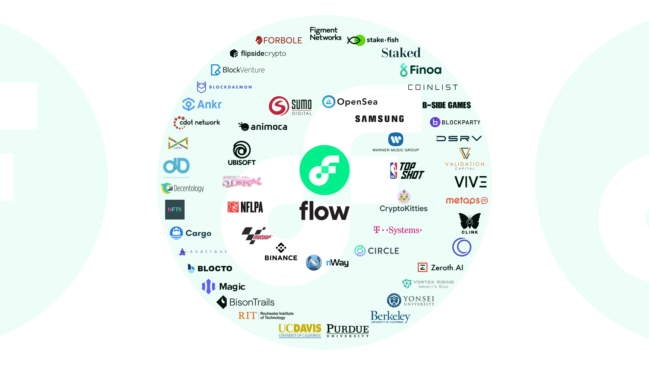Like the internet, blockchain has been pitched as the next revolution that will disrupt all major industries and change the face of technology forever.
But problems pertaining to scaling, high transaction fees, and clunky developer tools prevent expedited mainstream adoption from happening. Most scaling solutions merely divert challenges back to developers or put decentralization itself at risk.
However, one innovative blockchain that’s fast, secure, and developer-friendly is here. And it is ready to support the next generation of crypto games, dApps, and the digital tokens integral to these ecosystems.
How Flow Fixes The Current Problems Plaguing Other Big Blockchains
Dapper Labs, the creators of CryptoKitties and NBA Top Shot, has spent the last two years redesigning the Flow blockchain from the ground up for modularity. They ensured that the project becomes future proof for generations to come, and bolsters adoption through user- and developer-friendliness.
Unlike traditional blockchains that force every node to store the entire state of the network and process all transactions in the chain, compromising throughput, Flow’s multi-node architecture enables blazing performance at extremely low costs – all without sacrificing decentralization or sharding.
Even Ethereum is adopting sharding but at the expense of the core proposition and parity with the shared state across the blockchain. Sharding also potentially introduces attack vectors due to a delay added by different shards interacting with one another.
Extreme dependency on the primary blockchain only further muddy the waters for developers. Higher the usage, the higher the transaction fees. Rising gas fees on Ethereum have resulted in users avoiding transacting so as to not incur astronomical transaction costs. In one recent example, it cost nearly $25 in Ethereum gas fees(read gwei) to send just $100 in stable coins issued on the blockchain.
The explosion of DeFi applications and crypto tokens built on Ethereum has made the platform’s scaling issues stick out like a sore thumb, and could be the reason for the underlying asset ETH’s recent pullback.
Flow, however, takes a novel distribution approach and balanced token design that combines the best aspects of DeFi with developer-friendly tools, highly scalable four-node architecture, and a commitment to uncompromising decentralization. This lets developers focus on experience, and users enjoy speed and reasonable transaction costs, as well as an actively thriving ecosystem.
The Flow token enables participation on the platform, through which users can earn rewards. The crypto token demand is driven by platform activity like other DeFi tokens and allows for secondary tokens to be minted, such as stablecoins, governance tokens, and NFTs. A community token offering by FLOW will allow for widespread distribution and decentralization.
UFC, NBA, Warner Bros, & More Partner With Project To Bring Blockchain Mainstream
Flow brings together the power of decentralized finance and unrivaled scalability that has attracted partners like the Ultimate Fighting Championship, the National Basketball Association, Dr. Seuss, Warner Bros., and more to the blockchain space.
Dapper Labs is the company behind some of the most successful dapps on the Ethereum network and is now ready to launch the Flow blockchain for developers to build and innovate on themselves.
Their team of leadership executives, developers, and engineers brings together decades of experience across the likes of Hasbro, Glu, ESPN, NFL, NHL, Microsoft Research, Baidu, American Express, and countless others.
But beyond the outstanding credentials and track record of delivering some of the most popular products, what has these big brand names excited is Flow’s ability to issue secondary tokens like NFTs.
NFTs, are non-fungible tokens. These tokens aren’t interchangeable and are typically in-game digital assets for users to collect. However, they can also be community tokens and more. What makes these NFTs truly valuable is that they guarantee ownership, scarcity, durability, and authenticity. NFTs also let users re-sell the asset at any given time, or even pass them along to next of kin should they choose.
Typical in-game DLC or content is only licensed to users in most games and isn’t tradable outside of the ecosystem. Flow allows major companies to create rare, one-of-a-kind collectible crypto tokens or in-game assets that can become highly sought or act as the backbone to game communities.
Data shows that users tend to spend 10 to 100 times more on NFTs versus traditional in-game assets, due to the flexibility. The added sales penetration will entice more companies to create and build on the platform, further boosting the Flow crypto token’s demand both directly through its use and indirectly through ecosystem bootstrapping.
Dapper Labs created Flow with composability central to the experience so that developers can easily create new, innovative, next-gen dApps, games, and more, that are mainstream industry-ready. This composability could very well be the missing key to unlocking widespread adoption of blockchain technology by bringing together big brands on a highly-scalable, blockchain of the future.
To learn more about Flow, visit the project’s website or Discord channel. You can also find out more at Coinlist.
Disclaimer: The information presented here does not constitute investment advice or an offer to invest. The statements, views, and opinions expressed in this article are solely those of the author/company and do not represent those of Bitcoinist. We strongly advise our readers to DYOR before investing in any cryptocurrency, blockchain project, or ICO, particularly those that guarantee profits. Furthermore, Bitcoinist does not guarantee or imply that the cryptocurrencies or projects published are legal in any specific reader’s location. It is the reader’s responsibility to know the laws regarding cryptocurrencies and ICOs in his or her country.




